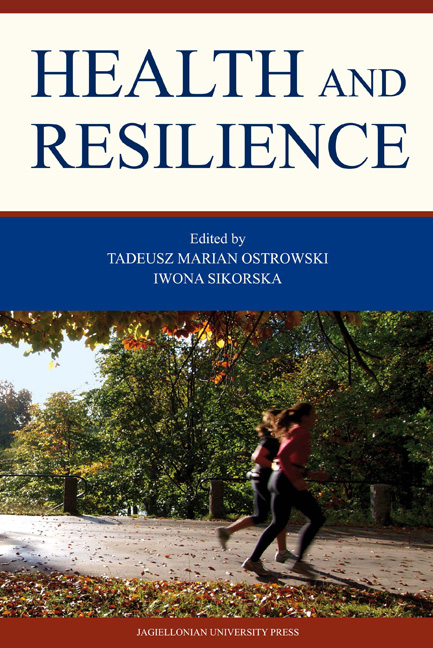Book contents
- Frontmatter
- TABLE OF CONTENTS
- Introduction
- I SOCIAL AND METHODOLOGICAL CONTECTS OF RESILIENCE
- Resilience in the light of research and theoretical reflection
- Naturalism, normativism and Havi Carel's phenomenological approach to health and illness
- Testing the sense of identity in people with highly functioning autism as theory-methodological problem
- “The beneficial life stories.” Health and mental resilience from the narrative perspective
- II RESILIENCE IN DEVELOPMENT
- III RESILIENCE AND DISEASE
- List of Authors
“The beneficial life stories.” Health and mental resilience from the narrative perspective
from I - SOCIAL AND METHODOLOGICAL CONTECTS OF RESILIENCE
Published online by Cambridge University Press: 05 December 2014
- Frontmatter
- TABLE OF CONTENTS
- Introduction
- I SOCIAL AND METHODOLOGICAL CONTECTS OF RESILIENCE
- Resilience in the light of research and theoretical reflection
- Naturalism, normativism and Havi Carel's phenomenological approach to health and illness
- Testing the sense of identity in people with highly functioning autism as theory-methodological problem
- “The beneficial life stories.” Health and mental resilience from the narrative perspective
- II RESILIENCE IN DEVELOPMENT
- III RESILIENCE AND DISEASE
- List of Authors
Summary
Abstract
The article aims to explore the narrative dimension of mental health and resilience. Empirically proven, the high adaptation value of the narrative structuring of individual experience is considered in the context of the relational health model based on the discursive approach. It encompasses a healthy and functioning adult personality as a complex model organising the diversity of individual experience (polyphonic structure) that emerges above the level of “subjective positions” in which individuals experience the world and themselves. In such an approach, the ability to transcend a one-sided point of view and the capacity for dialogue between various perspectives are the key to the mental health and resilience of individuals. This dynamic process derives from the formal and content characteristics of “self-narratives” created by individuals as well as the rules according to which they are combined into comprehensive life stories through narrative identity.
The description of the indicators of what is known as a “good/healthy self-narrative” that are presented in relevant literature and the overview of the essence of positive influence exerted in the process of creating a self-narrative (that ultimately have an impact on its “beneficial” nature) form a basis for defining “narrative preventive factors.” They can be used to design projects that aim at the narrative promotion of mental health and resilience. It is advisable that such projects additionally take into account the existential issues in the professional work that enhances the narrative structuring of individual experience.
- Type
- Chapter
- Information
- Health and Resilience , pp. 57 - 82Publisher: Jagiellonian University PressPrint publication year: 2014



